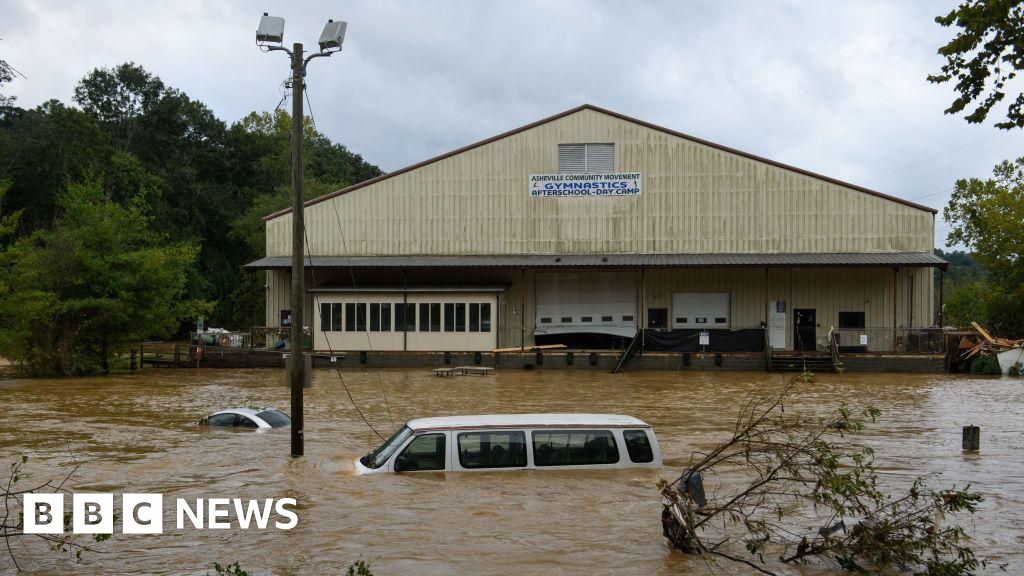
North Carolina reels from Helene
Posted on 10/01/2024

On Monday, Mayor Patrick Fitzsimmons found himself at the epicentre of a disaster zone.
His town of Weaverville, North Carolina, had no electricity and no power. Only one grocery store was operational, utility poles had gone down, the town’s water plant had flooded and people had been without safe drinking water for four days, he told the BBC.
In the larger Buncombe County, where Weaverville is located, at least 35 people are dead and 600 are unaccounted for, a local CBS News affiliate reported.
Mr Fitzsimmons said the county set up a website where people can inquire about missing persons. Officials have so far received 11,000 requests.
Across the US south-east, millions of residents were thrown into chaos by storm Helene. It slammed into Florida as a category 4 hurricane on Thursday before barrelling across the states of Georgia, South Carolina, North Carolina and Tennessee, leaving flooding, power loss and death in its wake.
In the days since, the true scale of the destruction is coming into sharper relief as residents begin to return home to survey the damage.
At least 116 people have died nationwide, officials have said.
One of those people was Madison Shaw’s mother.
“Her last words to me were… 'I love you, be safe. I'll see you later,’” the resident of Anderson, South Carolina told CBS News. “And I said, 'I love you. I'll see you later as well.'”
“I can't even describe it,” Ms Shaw told CBS News. “My mom was my best friend.”
"Homes have been destroyed, flattened," said 21-year-old Josh Griffith who lives just outside of Asheville in the town of Leicester.
"When it hit, we watched semi-trucks and storage crates and dumpsters and propane tanks floating down the river just rushing through parking lots, destroying everything in its path,” he told the BBC.
The apartment he shares with his fiancée sits high up on a hill and was safe from any serious damage. But on Saturday afternoon, by then without power or food, they decided to make their escape, taking rain-drenched roads out to north-east Georgia.
At one point, Mr Griffith and his partner were forced to drive straight through flood water, six inches deep of running water on top of six inches deep of mud. Emergency officials generally caution people against driving into flood waters of any depth during a storm.
"It was really scary," he said. "Any time you’re driving over rushing water like that, there’s a fear your tires might slide out from underneath you."
They made it out, stopping overnight in Georgia before driving back North Carolina, armed with food, water and supplies for their neighbours in Buncombe.
"People are just scrambling to get any resources they can," he said.
Buncombe County officials opened four water distribution sites throughout the county on Monday.
His town of Weaverville, North Carolina, had no electricity and no power. Only one grocery store was operational, utility poles had gone down, the town’s water plant had flooded and people had been without safe drinking water for four days, he told the BBC.
In the larger Buncombe County, where Weaverville is located, at least 35 people are dead and 600 are unaccounted for, a local CBS News affiliate reported.
Mr Fitzsimmons said the county set up a website where people can inquire about missing persons. Officials have so far received 11,000 requests.
Across the US south-east, millions of residents were thrown into chaos by storm Helene. It slammed into Florida as a category 4 hurricane on Thursday before barrelling across the states of Georgia, South Carolina, North Carolina and Tennessee, leaving flooding, power loss and death in its wake.
In the days since, the true scale of the destruction is coming into sharper relief as residents begin to return home to survey the damage.
At least 116 people have died nationwide, officials have said.
One of those people was Madison Shaw’s mother.
“Her last words to me were… 'I love you, be safe. I'll see you later,’” the resident of Anderson, South Carolina told CBS News. “And I said, 'I love you. I'll see you later as well.'”
“I can't even describe it,” Ms Shaw told CBS News. “My mom was my best friend.”
"Homes have been destroyed, flattened," said 21-year-old Josh Griffith who lives just outside of Asheville in the town of Leicester.
"When it hit, we watched semi-trucks and storage crates and dumpsters and propane tanks floating down the river just rushing through parking lots, destroying everything in its path,” he told the BBC.
The apartment he shares with his fiancée sits high up on a hill and was safe from any serious damage. But on Saturday afternoon, by then without power or food, they decided to make their escape, taking rain-drenched roads out to north-east Georgia.
At one point, Mr Griffith and his partner were forced to drive straight through flood water, six inches deep of running water on top of six inches deep of mud. Emergency officials generally caution people against driving into flood waters of any depth during a storm.
"It was really scary," he said. "Any time you’re driving over rushing water like that, there’s a fear your tires might slide out from underneath you."
They made it out, stopping overnight in Georgia before driving back North Carolina, armed with food, water and supplies for their neighbours in Buncombe.
"People are just scrambling to get any resources they can," he said.
Buncombe County officials opened four water distribution sites throughout the county on Monday.
Comments( 0 )
0 0 0
0 0 2

:quality(70)/cloudfront-us-east-1.images.arcpublishing.com/adn/JF6FH7DLYVBLZMKLMUUM52A2CI.JPG)




















